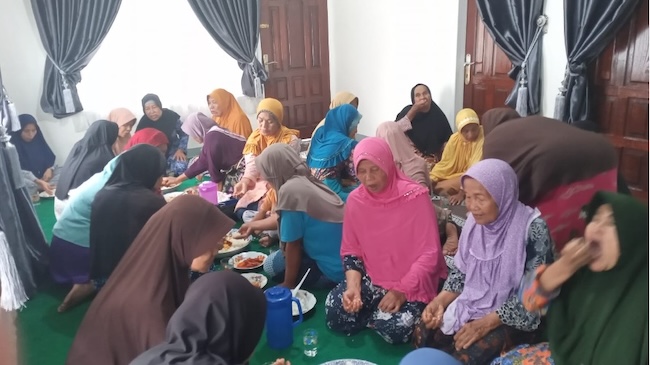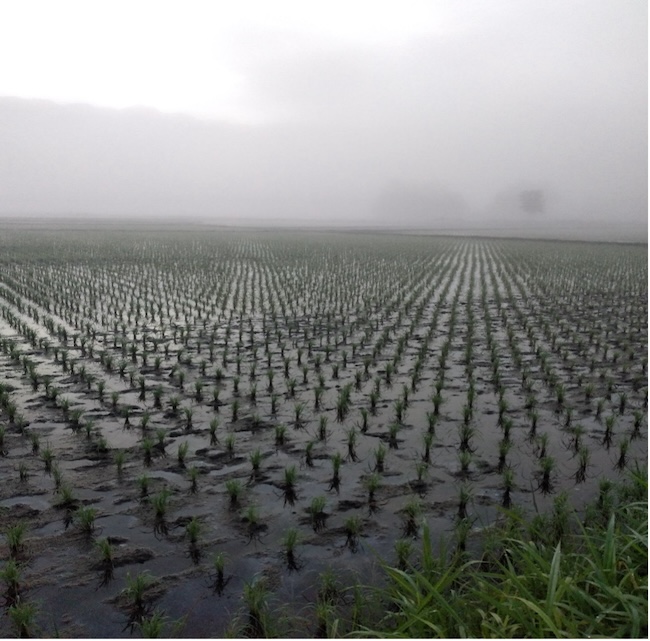Tradition helps Minangkabau protect the land from foreign investors
Rika Febriani
After almost 40 years of living in the Minangkabau region, I have come to realise how little the environment here has changed. Rice fields continue to produce. Fruit trees like durian and mangosteen, and cash crops like cacao, are still being cared for. My family clan manages the land the way it has always done. Like many in my community, I did travel away from my home (we call this merantau). But now I have returned for good to my small hometown of Kamang Hilia, population 5,000. Ours is a rural area in the Agam Regency, on the edge of West Sumatra’s Bukit Barisan mountain range.
People here feel bound to the land by many strong traditional bonds. In other parts of Indonesia, investors from the big cities have used the power of their cash to break such bonds and turn the land into a commodity. They have established oil palm and rubber plantations - monocultures run by machines, in which the soil is quickly degraded. But in Minangkabau, the bonds remain so strong that outside investors have so far been unable to break them. Let me explain what those bonds mean to us, and how they protect our environment.
I am privileged to be a Minangkabau woman, a member of an indigenous group with the largest matrilineal system in the world. I grew up with Islamic values intertwined with adat (custom). There is a saying that is so often repeated that it became deeply ingrained in my upbringing. It is regarded as the Minangkabau philosophy. It runs like this:
Adat basandi Syarak,
Syarak basandi Kitabullah;
Syarak mangato,
Adat mamakai
Literally translated, the aphorism means that Minangkabau customs are based on Islamic law:
Custom (Adat) rests on Islamic law (Syariah),
And Islamic law rests on the Quran and the traditions of the Prophet (Sunnah);
Islamic Law speaks,
Custom acts
I remember my mom sharing zakat when we celebrated a paddy harvest, following the Islamic law to give to the poor and needy.
Long before I knew what environmental conservation was, the Minangkabau people had been practising it for centuries. Outsiders might see this as a rural, slow economic growth society. I see it as a way to defend our land. It is custom that does it. I once asked a customary leader about this, an older man whom we honour with the title Datuak. He told me how he had several times seen investors come from outside the area, looking for consensus on setting up a plantation. But such negotiations are very complex in Minangkabau, and in the end they gave up their intentions.
Communal obligations
I inherited rice fields passed down through my maternal family. Such property is called harato pusako tinggi. It can be in the form of rice fields, or ponds stocked with fish. On my fields there is also a Rumah Gadang - one of those magnificent peak-roofed communal houses, richly decorated with wood carving, that you see in Minangkabau tourist brochures. Owning harato pusako tinggi comes tied with obligations to my wider clan. I cannot just do with it whatever I want. It is for example very difficult to transfer ownership. To sell or even to mortgage it I must obtain the agreement of the customary heads (here known as penghulu) at the level of the clan. They will require me to guarantee I shall continue to look after the rice fields and keep renovating the Rumah Gadang. And don’t expect a quick decision in such a case. The process can take years. Most such negotiations ultimately fail.

Doing this is not simply a matter of obeying instructions. It is a question of pride. Until now, I and my clan have not sold or mortgaged any of the property entrusted to us. Customary land is an integral part of the matrilineal social system. Even if the ownership should happen to change, the land will still remain within the Minangkabau clan system. This ensures that any land use change is minimal. Where in other parts of Indonesia land is much more easily sold to commercial interests for the purpose of planting oil palm, with all its destructive effects on the soil, here in Minangkabau the land is protected by a cultural safeguard. Land has an active function within Adat.
Forest
Some of the forested land in this mountainous area can also play a role in Adat. Sometimes it has been aside traditionally as a sacred grove (hutan larangan). Such sacred forests – homes to spirits and ancestors - have been known all over the world throughout history, and they continue to exist also in West Sumatra. Rahmat, a community organiser in Agam Regency, explained to me that hutan larangan can be seen as a conservation area. You are not allowed to cut the trees or taken any commodities from such a forest. The taboo is strong, and people who violate the forest will suffer, perhaps through illness or accident.
Beyond the hutan larangan, forests in West Sumatra can also be managed well by the local community. This is known as social forestry, or community forestry. The West Sumatra provincial government’s Forestry Agency has encouraged social forestry schemes as a way of mainstreaming community-based forestry management. Since 2012 it has allocated 500,000 ha of state forest for social forest schemes. Its success can be seen from satellite imagery released by the Agam Kuantan Land Rehabilitation and Soil Conservation Center. Of the 200,000 ha of protected forest and limited production forest photographed by the satellite – much of that managed as community forests - only 22 per cent had been logged over the past decade.
Leadership
In Minangkabau, culture works together with the mountainous terrain to preserve the environment. It may be slow and complex, but this collaboration has successfully safeguarded the land from foreign investment pressures. Culturally sensitive leadership is a big part of this success. One of the customary leaders in the Baso sub-regency of Agam is Haji Bustamam Datuk Manindiah. He heads up a local customary council called the Lembaga Kerapatan Adat Nagari. He explained to me that political leadership among the Minangkabau people combines two leadership models. The Panghulu (or penghulu) are representatives of the clans. Their leadership style is collective and very democratic. The Rajo by contrast are related to the kings (raja) that formerly ruled the area, and their leadership style reflects that. Leadership is exercised at different levels, from the smallest hamlet to a larger area known as the Nagari. The latter is inhabited by at least four clans. I have observed political discussions in the office of the Nagari head, and indeed, the procedures were lengthy, the tone argumentative, but the aim was always to reach consensus.
The role of the penghulu is particularly strong in yet another, much larger, traditional political unit of the Minangkabau region known as the Luhak, which is a confederation of Nagari. I live in the Three Luhak area (Luhak Nan Tigo, because it consists of three luhak namely Luhak Tanah Datar, Luhak Agam, and Luhak Limo Puluah Koto). What’s special about this area is not just its leadership, which is heavy on the egalitarian penghulu, but also its geography. Each luhak has unique characteristics related to land use that support environmental preservation. Luhak Nan Tigo is located on a plateau around the famous active volcano Mount Marapi (not to be confused with the Mount Merapi near Yogyakarta in Java). Such mountainous land is unsuitable for the plantations of oil palm and rubber found in other parts of Indonesia. The mountains catch too much rain, and the land slopes too much. But it is suitable for rice fields. People have built terraces on the slopes for this purpose for thousands of years.

In Minangkabau, traditional political units such as the Nagari work together with the official government structure of Regency and Sub-Regency. I asked the head of my own Nagari about this. What was the relationship between the formal leadership (head of Regency) and the cultural leadership (head of Nagari) in shaping environmental policy? He said that they are intertwined, for example when drafting regulations about spatial planning. The Panghulu, who usually has the title of Datuak meaning respected elder, enjoys the respect of government officials within the formal structure of government. This is especially true in today’s era of electoral politics, where formal government leaders want to get re-elected.
During election season we will often see candidates for executive or legislative office hanging out in the little local coffee shops known as lapau. They are hoping to gain public sympathy. The lapau is becoming an important public space, a representation of the Minangkabau cultural world. In contrast with the modern coffee shop springing up across West Sumatra, the lapau evokes a village ambiance, similar to those that have appeared in Bandung, Jogja, and Bali.
They do sometimes come at a cost to the environment. The devastating flood in May 2024 not far from my home is a reminder of this. Restaurants built in what should have been a protected forest area in the Anai Valley near Padang Panjang contributed to the disaster. As we pursue economic development, we must ensure it does not come at the expense of the natural beauty that makes Minangkabau so beloved.
Rika Febriani (rikafebriani@fis.unp.ac.id) teaches in the Social Science Faculty at Universitas Negeri Padang.











